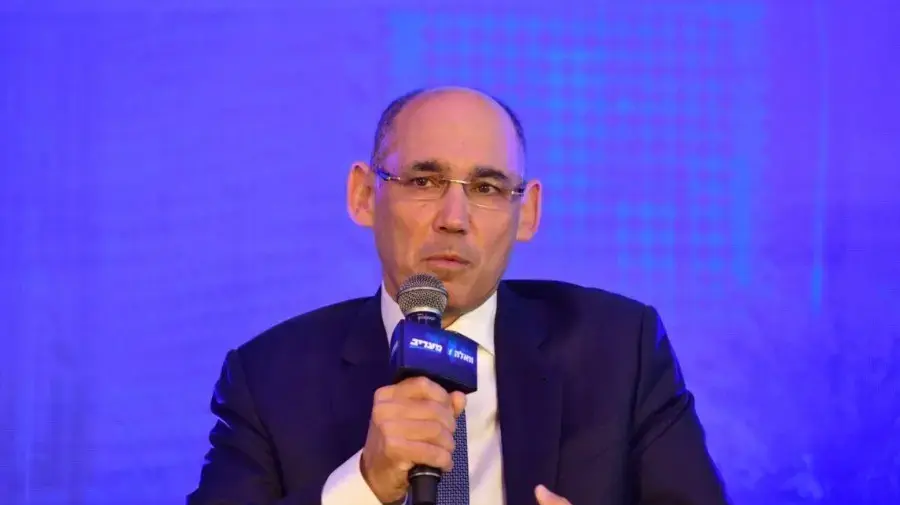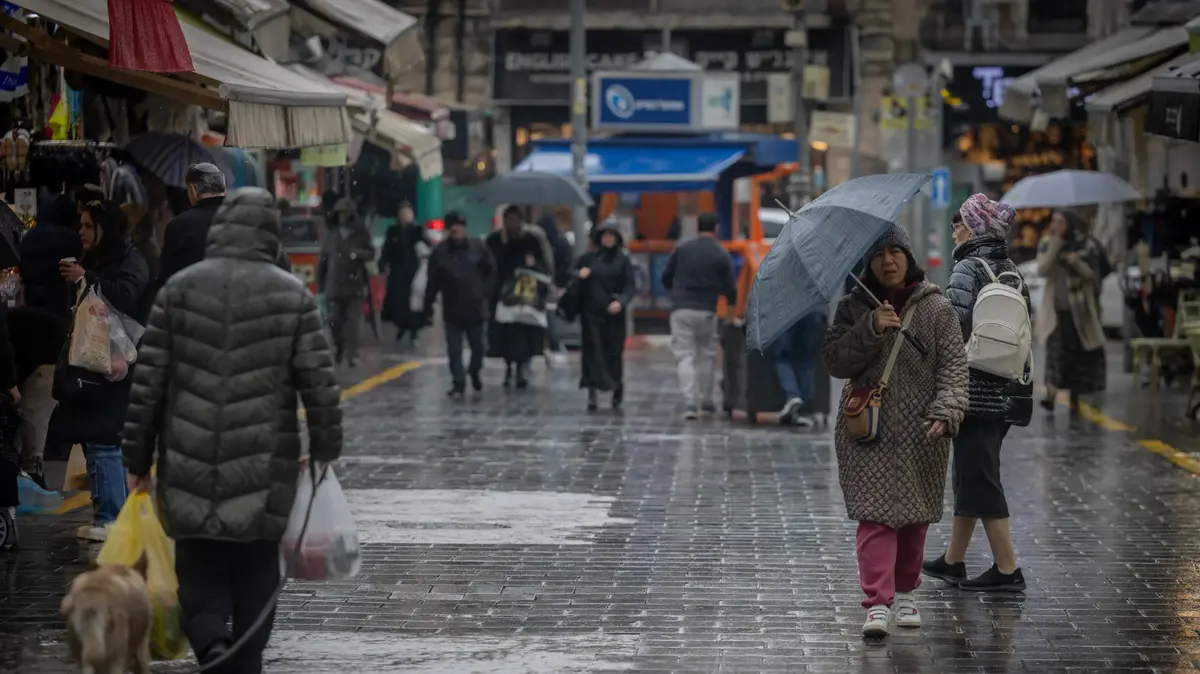"Even the contractors are afraid to build"
Raul Sargo, president of the
Haaretz Association of Builders Contractors:
"The figures published last month by the Central Bank are very bad for the State of Israel. The figures prove that the housing market is at a standstill only because of the high interest rate.
In our estimation, in the summary of 2022 we will see construction starts that will range around 60 thousand housing units only, about 20% less than what the government expected.
The government and the governor of the Bank of Israel must understand that the number of Israelis who want to buy apartments is only increasing, but they are afraid to take out mortgages at high interest rates.
At the same time, the contractors are also afraid to build because of the high cost of the loans to finance the construction.
Continuing to ignore the full picture in the housing market and the supporting infrastructure will bring us to another double-digit price jump next year.
I call on the Ministers of Finance, Housing and the Interior to sit down with us and create a plan that does not guarantee benefits to a limited group of apartment buyers, but one that will solve the housing crisis in a short time and that is certainly possible."
freepik, photo: freepik
"A type of correction"
Nechama Bogin, chairman of the Real Estate Appraiser's Office:
"In the coming year, there will probably be a slowdown in apartment prices, a kind of correction, to the extreme increases that were in 2022. The reason for this is due to the prevailing uncertainty in the housing market. On the one hand, a changing interest rate environment, on the other hand, there is a new government that has not yet presented a comprehensive housing plan, so there are a lot of people who are sitting on Set up and await the news. From past experience, the current situation will only lead to continued increases, and this is because the gaps between supply and demand are still high and there is no synchronization between the planning goals of the planning manager and the actual execution of construction starts. In order to provide a real solution, a significant push for urban renewal in the city centers and the promotion of plans are needed for long-term rental".
"Stabilization up to an annual increase of 5%"
Vared Zarfati Zebulon, co-CEO of the Zarfati Shimon Group and chairman of the audit committee at the Haaretz Builders Association:
"I believe that the real estate market is on its way to stabilization. In my estimation, we will not see a 20% price increase in apartment prices in the coming year as in the past year, but neither are expected significant decreases in prices, but only a stabilization until an annual increase of about 5% as in the consumer price index. I base my assessment on a balance between several factors: on the one hand, the spike in interest rates that increases mortgage repayments and makes it difficult for buyers to take out new loans, but on the other hand An 8% jump in rental prices in the last year and even more in some cities, an increase that is sharper than the increase in interest rates in the economy, compared to an average annual increase of 3% in the last decade.
So the alternative of renting to owning an apartment is no longer that attractive.
freepik, photo: freepik
At the same time, 20,000 new households from Ukraine increased the demand for apartments, and at the same time, a perennial shortage of nearly 200,000 apartments in the market, prevents apartment prices from falling sharply."
"The demand curve will remain rigid"
Tamir Cohen, CEO of Shikhun and Binui Group:
"It is deceptive that due to the slowdown in demand that is currently evident in the market, we will see a drop in prices in the coming year. On the contrary, in a country characterized by accelerated growth like Israel, where the birth rate is high, the supply of housing has been low for over a decade, and there is active investor activity - all of these only contribute to the fact that the demand curve will remain Forever rigid, which contributes to price levels continuing to be high. In the end, what will decide where prices will go is not only the interest rate, but the gaps between supply and demand. As far as supply is concerned, I do not see the possibility of prices falling in the near future as long as demand is still very high, The supply is not enough, so it will take time until we reach a state of equilibrium in the market."
"The market goes where the government decides"
Attorney Ronit Shabiru, owner
of the 'Shabiro' association of companies:
"Only when inflation rose in the US by more than 8% and in Israel by more than 4.5% did the governors of the banks decide to raise interest rates, but not in a gradual and slow manner, these painful and frequent "blows" of 0.75% and 0.5% each month, and in fact caused the market The real estate in the world to cool down and in Israel in particular, in a way that simulates a flu patient who receives antibiotics in a dose three times higher than he needs and three times more often than usual.
This dose is dangerous for the economy.
At once, all the investments that relied on the prime interest that was customary in the economy became less viable.
The real estate market is going where the new Israeli government has decided, therefore a strong and inclusive leadership is required to move the market forward."
"Immediate increase in the scope of construction starts"
Micha Klein, CEO
of Africa Israel Residential:
"For the incoming government, a central goal with regard to the real estate industry - an immediate increase in the scope of construction starts.
In order to realize this goal, it must promote a number of moves, including promoting steps to deal with the bureaucratic barriers, which are part of the reasons for the slow progress of the supply in the market.
Therefore, barriers that prevent and delay the realization of available land must be released.
Also, a solution must be provided for the serious shortage both in manpower standards and in the salaries of officials who will staff them in the licensing departments in particular and in the local authorities in general.
At the same time, and considering that privately owned land constitutes a significant part of the vacant land throughout the country, incentives must be provided to private land owners, in order to speed up construction on them."
"Demand for apartments has not decreased"
Arnon Friedman, CEO of Ashdar from the Ashstrom Group:
"In recent months, following the significant changes experienced by the real estate industry, we have seen a large decrease in the volume of purchases of new and second-hand apartments.
This decrease contributes to price stability, but the demand for apartments has not decreased.
Israel's population continues to grow, which ensures continued demand for new apartments.
The change in the pace of construction starts and the pent-up demand of the public is expected to once again create a gap between the real demand for apartments and the number of apartments under construction that have not yet been sold.
Those who are going to be greatly affected by the decrease in the rate of apartment purchases are housing improvers who have purchased a new apartment and have not yet sold their previous apartment, who will probably have to take bridging loans at high interest rates until the sale of their previous apartment and in order not to lose the purchase tax benefit they will have to compromise and sell their previous apartment at a low price They expected him from him."
"People prefer to sit on the fence"
Efi Shakdi, Chairman and CEO of Efi Capital Real Estate:
"Following the recent increases in interest rates, mortgages became very expensive and this meant that the free money that couples and potential buyers had was significantly reduced. The resulting snowball causes great difficulty in taking out mortgages, so many people currently prefer to sit on the fence and purchase fewer apartments.
As long as the current trend continues, we will continue to see a decrease in the amount of transactions alongside a spot price drop in different areas of the country.
The current situation is also characterized by the coming together of a new government that will outline a new policy in the area of housing, therefore the combination of the increase in interest rates and the wait for a new government program in the area of housing causes pent-up demand that will erupt and lead to price increases again in a period of about one and a half to two years from now."
"I don't expect there to be a drop in prices"
Avishai Ben Haim, CEO of Rothstein:
"Following the increase in interest rates in the economy, I expect there to be a slowdown in sales in the market as a whole, but I do not expect there to be a significant drop in prices.
If there is a slowdown, it will most likely be a one-off, short-term event and a drop in prices of a few percent, because the basic problems of lack of land supply have not been solved, alongside cumbersome regulation that slows down the pace of construction starts.
I estimate that, in general, prices in the medium and long term will continue to rise.
Despite this, the volume of the company's apartment sales in 2022 remains high, and we expect 2023 to be just as good."
"Entrepreneurs slow down the pace of construction"
Itzik Baruch, CEO of Yuval Group:
"The interest rate affects the industry and leads to a slowdown in the rate of sales, but the data in the country as a whole does not indicate a drop in housing prices. I do not expect that there will be a significant drop in prices, mainly because there is still a need for tens of thousands of units in the market.
Due to the uncertainty in the market, developers are slowing down the pace of construction, but demand remains high, so even if there is a spot drop in prices, it is expected to be only temporary.
Beyond that, urban renewal projects that have been gaining momentum in recent years, where relatively low equity is required from the developers, are less sensitive to market volatility."
"Real estate is the alternative to investment"
Shalom Shtrit, CEO of the Shattit Group:
"In the next four months to the next six months, we expect to see declines of 3-7 percent, mainly declines in sales and then again a return to prices and more extensive activity. After all, real estate is the Israeli alternative for investment.
For the new year, there should be a move to freeze mortgages or cancel the margin in the prime interest rate.
After all, the banks earn NIS 20 billion a year and are the biggest profiteers from the increase in interest rates, therefore a mortgage must be subsidized or supervised, especially for those entitled to a first apartment.'
"There will be no drop in prices"
Yossi Abrahami, chairman and owner of the
Yossi Abrahami Group
I believe that the real estate market is at a crossroads. On the one hand, there has been a decrease in the number of transactions every month for several months, which in my estimation is mainly due to the public's uncertainty and lack of confidence in the government's ability to influence the market. On the other hand, prices are not falling and I don't think there will be a drop either at prices in the short and medium term, because demand continues to be high. The amount of apartments being sold is decreasing due to the lack of a guiding hand and due to a high interest rate environment that leads buyers to sit on the fence and makes it difficult for entrepreneurs to purchase land and establish projects. This is how pent-up demand is created in the market, and when they burst I estimate that the sales Prices will soar again and so will the prices. If the state wants to balance and stabilize the market, it needs to significantly reduce real estate taxation, shorten bureaucratic procedures and, above all, take care of the supply side."
"The stock of apartments is shrinking"
Avi Zithoni, CEO of the A. Zithoni company:
"I estimate that 2023 will be a year of containment in apartment prices and there may even be a real erosion, but in my opinion prices will rise again towards the end of 2023 and the beginning of 2024 due to a lack of supply of apartments on the market.
Although at the end of last year we saw a wave of land marketing by Rami to increase their numbers, in practice these apartments will only reach the market in at least four years due to the bureaucracy in issuing building permits. Due to the change of government, there is currently almost no state land marketing, and even if there is - The bureaucracy is delaying everything. In the meantime, the stock of apartments owned by contractors is shrinking, contractors are afraid to start new projects because of a sharp increase in interest rates that significantly increases financing expenses, and the banks are also afraid to provide banking support because of the high interest rate environment. The state needs to free up as much land as possible, ease the licensing procedures, and see how it is possible to secure bank financing for projects.'
"At least the prices are not rising"
Sharon Pershkovsky, CEO of Pershkovsky Investments:
"Most developers today have a very low inventory of apartments for sale. On the other hand, when you look at the medium or long term, the effect is the opposite. On the one hand, some developers stop purchasing land, some slow down the pace of construction, some stop starting construction or issuing permits for new buildings. These actions will cause in the not-too-distant future a further decrease in supply, and then when all those undecided/cautious people 'get off the fence' (which regularly happens almost at once) they will encounter a market with significantly lower supply, which may lead to a price increase, as has happened throughout the decade The latter time and time again. So what can be done? I recommend to those who can afford it, to take advantage of the coming period when the market is somewhat cooling and prices are at least not rising and buy the apartment that suits them."
"Government tenders need to change"
Mario Zozel, co-owner and chairman of Almogam Holdings:
"In order to bring about a real change that will lead to a solution to the housing crisis in Israel, the government tenders should be changed in such a way that they are intended for an equal distribution to the eligible (50%) and housing improvers (50%) and will be priced at the maximum price per square meter apartment, when the competition in the tender will be on the discount rate that will be given to "My apartment and not on the price of the land. In addition, in order to help the apartment buyers - young couples and housing developers - the state should set the VAT rate for buyers who are their first apartment at 10% and exempt them entirely from the purchase tax, provided that the apartment is up to 105 m" in size. R., while the VAT rate for housing improvers will be 17% and they will be exempt from 50% of purchase tax. In this way, the state will provide a real answer to a broader market segment, beyond the market segment of those entitled."
"People are afraid to buy at a high price"
Yikki Amsalem, CEO of Almog Group:
"What characterizes the market right now is the search for opportunities. In places where prices are high, the market is still hesitant and sales are moderate. On the other hand, in projects where prices are affordable, such as our project in Haifa - 'Almog Carmel West' - customers understand the opportunity and therefore buy apartments and do not wait. This indicates that demand has not really decreased nor can it decrease, this is due to natural growth and the need for people to establish themselves and build a house. What has changed anyway? People are mainly afraid to buy today at a high price, and in addition they are afraid to make a commitment because of the high interest rate and the uncertainty regarding what will happen with it in the future ".
"Demands exist and are tough"
Eyal Handler, chairman of the Canaan Group:
"Demands exist and are stiff. Sales have stopped due to the expectation of lower prices and because prices have recently risen drastically. Unfortunately, we have come to know in the last decade that whenever the demands reach a situation where they are held inward, in anticipation of new news from the government, they erupt again even more strongly after a period of several months, Because these are real demands.
This gap continues to widen between demand and supply, and the bottom line is the basic need of citizens for adequate housing."
"Demand for new apartments remains high"
Shai Abuhchira, CEO of Sela Binui:
"On the ground, we see that despite the extreme talk about the increase in interest rates, the demand for new apartments remains very high and we must not forget that the housing market in Israel lacks over 200,000 housing units.
The only way today to overcome the huge gap between demand and supply in the real estate market is to promote fundamental and long-term reforms such as shortening licensing times through advanced self-licensing technologies, promoting temporary orders that will allow developers to add construction areas for small units and increasing the density in the complexes available for construction.
Also promoting reforms that will speed up the duration of early preparation and licensing for urban renewal projects".
Strengthening of demand and a return to increases"
Danny Moore, CEO of Best Initiative from the BST group
"We saw that even after the "doomsday weapon" was issued, which was the increase in the price of silver and its immediate effect on the amount of monthly mortgage repayments and the cooling of demand, it is possible to identify the first signs of buyers' adaptation and the banking system to the new interest rate environment and a gradual return to the sales offices.
On the supply side, there has been a significant decrease in the number of participants in RMI tenders and a decrease in the rate of construction starts is expected.
In addition, this is an election year for the local authorities in which there is a "downshift" in approving plans and issuing permits.
All of these support the fact that the end of the year is expected to be with stronger demand and a return to the path of moderate price increases."
"We will not experience any more price increases like before"
Tzachi Aharoni, assistant to the CEO of Dan Real Estate from the Dan Transportation Group:
"I predict that in light of the increase in interest rates and the similar forecast in the coming months, we will no longer experience price increases as we experienced last year, but rather maintaining the existing situation. In the areas of demand, it is likely that there will be a moderate decrease in prices, and in Tel Aviv there will be an even greater decrease.
However, a significant drop in prices is not expected due to two main reasons: one is the fact that demand has not decreased due to the natural increase in the population and the second is the lengthening of the planning and construction processes which slows down the pace of releasing the apartments to the market.
The construction costs and the tough demands in front of the high financing costs will eventually create a balance that will maintain the price levels, but will certainly not cause a significant drop."
"Thinking upside down"
architect Orit Seman Tov Pinchas, senior lecturer at Tel Aviv University, owner and CEO of Archod Group:
"We have to think the other way around, plan the areas of employment, culture, and commerce first and develop the residences around or within them, it is recommended to mix uses.
It is possible to crowd the existing cities and expand the open areas, to encourage a change of zoning and reuse of existing buildings.
Already today, there are examples in the world of the development and implementation of smart cities, while integrating artificial intelligence, information-rich systems and the development and use of advanced technology."
"On the way to a balance point"
Roni Cohen, CEO of Elder Marketing
The marketer of over 90 projects throughout the country: "
The real estate market today is close to a balance point. There is an informed activity of buyers and sellers and deals are being signed, because the demand has not disappeared."
There are still large gaps between demand and supply, when in the last decade there has been a shortage of 120-150 thousand apartments in the market and the pace of construction is not catching up with demand.
At the same time, the bureaucracy is burdensome, the licensing procedures are not shortened and the increase in interest rates increases the funding costs for entrepreneurs.
According to this, I conclude that there is not expected to be a significant drop in apartment prices."
"To oblige old buildings with the approval of engineer
Tzachi Katz, chairman of the Union of Engineers and Architects of the Cities, and the city engineer
of Modi'in-Maccabim-Reot
"Today, the lack of infrastructure is an obstacle in the marketing of housing units in different parts of the country.
In the past year, we experienced another year of upheaval following reforms and changes in the planning and construction law, and I call on the government to start and act on the legislation of a new planning and construction law, which fits the spirit of the times.
Also next year we will be accompanied by the theme of the 'old buildings', which some call it, unjustly, 'dangerous buildings'.
We must act on this matter and not wake up only when buildings collapse, and also provide the local authorities with tools, through legislation, that will make the property owners inspect the building, maintain it on an ongoing basis and oblige to bring an engineer's certificate about the building's stability once every 3-5 years."
"The ultra-orthodox are the ones who will benefit"
Ohad Danos, chairman of the Shamai Bureau
The former realtor, the real estate expert
"The year 2022 will be remembered as the year of the recession in real estate.
The year we realized that not every government change is a change for the better and that when there is a failure in a particular market, the free market policy does not work and can only help double-digit price increases.
The year 2022 will also be remembered as the year of the interest rate - the year when the change began, and the increased interest rate is the one that will finally lower the prices.
The year 2023 will already be the 'year of the ultra-orthodox'.
Whether the prices go up or down, the ultra-Orthodox will benefit.
A new city, grants by choice, and sectoral control.
Once again, a self-interested party is at the head of the real estate market, which will take care of its voters first and only then for all of us."
"The projects in the state tenders are delayed"
Avi Tam, CEO of the real estate entrepreneur Asia Cyrus:
"After a mistaken expectation that prices would drop, which led to a slight freeze in sales in the market, prices will continue to rise, but in a more moderate way. Despite the large amount of tenders issued by the state in the last year, the projects are still delayed due to a lack of manpower in the local committees. On top of that, there are many other problems such as : Rami's tender system (the highest bid wins), the distortion that creates a target price plan and the prices of raw materials and construction that only go up.
In Israel there is a great shortage of apartments and great demand, but the halt in sales at the moment will lead to a greater wave of demand, and another price increase that will be recorded in the coming year."
"The projects that mature grow"
Ran Malach, CEO of the Urban Renewal High School Builders:
"The number of projects being developed is increasing and the times are getting shorter. It is evident that the authorities have begun to take active actions to reduce supply gaps and significantly promote urban renewal projects, with the understanding that this is the only way to increase the supply of apartments in demand areas, but more importantly to improve the quality of life of the old neighborhoods are In terms of safety, when tens of thousands of apartments are not earthquake resistant and do not have air conditioners, and in the social aspect.
The planning committees and local authorities are involved and push more to promote the beginnings of projects, we have seen this throughout the year and I estimate that it will increase and we will see further significant development in the years to come."
"Childhood will win"
Giora Sharbat, co-CEO of Sharbat Brothers
:
"The population in Israel stands at 9.6 million inhabitants, the State of Israel ranks first in the number of births per woman in the Western world, by a huge gap from the average of the OECD countries.
Therefore, when you look ahead at the real estate industry and the demand for apartments, you realize that it is not possible to stop the demand. The population is growing at a fast rate, therefore moves such as raising the interest rate in the economy only produce a slight slowdown in order to increase.
Businessman with umbrella protecting himself from storm problem, Financial Protection, Insurance, Shield from Problem and Crisis, photo: freepik
The year 2023 will be a year of adaptation to the new interest rate environment and an environment of an increase in the consumer price index, which also affects the increase in rental prices.
The result will be excess demand for new apartments at low prices."
"Preparing and adapting to an unfamiliar reality"
Dan Kachanovsky, CEO of the Real Estate Center:
"החדות והמהירות שבהן עלתה הריבית טלטלו את שוק הנדל"ן והביאו אותו למצב של היערכות מחדש והסתגלות למציאות לא מוכרת. הדבר מתבטא בירידה בנפח העסקאות ובנהירה של הציבור לשוק השכירות. נראה שבשנה הקרובה הגמגום הזה של שוק הנדל"ן יימשך, עם גידול בביקוש הכבוש מצד זוגות צעירים, משפרי דיור ומשקיעים כאחד.
עד מהרה נבין שכל מה שקורה עכשיו הוא בסך הכל שלב ביניים. מומחים מעריכים כי כבר ב-2024 תשנה הריבית כיוון ותחל במגמת ירידה, בין השאר כדי להשיב את הצמיחה לכלכלות המקומיות. עבור השחקנים בשוק הנדל"ן הישראלי, יהיה זה האות לרדת מהגדר ולהסתער על הדירות מחדש"
״אותם צעירים יחזרו לשוק״
אמנון מחרז, מנכ"ל יזמות קבוצת בראל:
"בשל הגידול המואץ באוכלוסייה, הביקוש לדירות בישראל הוא לא רק קשיח אלא הולך וגדל, ללא התאמה מבחינת הגידול בהיצע. הגידול נובע מילודה גבוהה ומעלייה. בשנת 2022 עלו לישראל 50,000 איש, זאת עיר חדשה. עדות לביקושים הכבושים ניתן לראות ב- 90,000 זכאים שנרשמו להגרלה האחרונה של 6500 יח"ד במסגרת תוכניות הדיור הממשלתי. אותם עשרות אלפי זכאים שלא יזכו זקוקים לדירת מגורים, לרכישה או בשכירות. אני מעריך שאחרי הסתגלות לסביבת הריבית הנוכחית, אותם צעירים יחזרו לשוק ויחפשו דירות במחירים התואמים את ההון העצמי ויכולת ההחזר החודשי".
״עיקר ההאטה - בשוק דירות יוקרה״
נועם גרייף, מנכ"ל עמרם אברהם:
"בשונה מהמגמה הרווחת בשוק הדיור בחודשים האחרונים, לא ניכרת עצירה במחירי הדיור, אולם הצפי הוא שקצב עליית המחירים יתמתן. במשרדי המכירות של החברה לא ניכרת האטה מכיוון שהחברה פרושה במגוון פרויקטים ברחבי הארץ מצפת ועד אילת, ומציעה מנעד מחירים רחב. עיקר ההאטה מורגשת כרגע בשוק דירות היוקרה. עם זאת, החברה אינה מתרכזת רק בתחום הנדל"ן למגורים ומתרחבת לתחומים מניבים ביניהם לוגיסטיקה, דאטה סנטר ומלונאות שזוכים לביקושים גבוהים וכן התחדשות עירונית".
"ימשיכו לבנות כ-80,000 דירות בשנה״
רוברט ראובן סיבוני, בעלים ומנכ"ל חברת נווה ים סוף:
"למרות מלחמת רוסיה-אוקראינה, וההשפעה הכלכלית בעולם ובארץ שבאה בין היתר לידי ביטוי בעליית ריבית וחומרי הגלם, צפויה האטה קטנה ברכישת דירות. לצד זאת היזמים/קבלנים ימשיכו לקדם פרויקטים בעיקר דרך התחדשות עירונית כי מרכיב הקרקע זול בהשוואה לרכישת קרקע בשוק חופשי או במכרזים. לדעתי יבנו כ-80 אלף דירות ופיתוח המדינה ימשיך, למרות תחושת חוסר הוודאות בעניין משילות הממשלה החדשה. בישראל קיים מחסור בהיקף של כ-200 אלף דירות, מה שמהווה מנוע כלכלי שמשפיע על היזמים להמשיך לבנות פרויקטים".
"מסתגלים למצב החדש”
אלי רוזנטל מנכ"ל ארגון הקבלנים והבונים מחוז ת"א והמרכז:
"שוק הדיור נמצא כרגע בשלב של הסתגלות למצב החדש – סביבת ריבית משתנה וממשלה חדשה שטרם הציגה תוכנית דיור מסודרת שתטפל במשבר הנוכחי.
אנו רואים שלא מעט רוכשים יושבים על הגדר וממתינים להחלטות הממשלה ונגיד בנק ישראל.
שלב הביניים הנוכחי צפוי להסתיים לקראת סוף הרבעון הראשון של השנה כך שעד אז נראה ירידה משמעותית בכמות העסקאות, אבל לאו דווקא במחירי הדירות שכן מרבית דירות הקבלנים נמכרות על הנייר.
עד סוף השנה נראה עליית מחירים מתונה בעיקר באזורי הביקוש. בפריפריה, ככל הנראה תהיה התייצבות במחירי הדירות. לעניין תוכנית שיווק הקרקעות של המדינה ל-2023, במידה וההיקפים יהיו בסדר גודל דומה לשנה החולפת זה יקרין אופטימיות מסוימת ואולי נתחיל לראות לאט לאט איזון בין ההיצע לביקוש”.
"אין בסיס אמיתי לירידה במחירים״
רז שרייבר, בעלים שותף בחברת אינהאוס, שיווק פרויקטים:
"מהמחצית האחרונה של 2022, חלה בלימה בביקושים, בעיקר על רקע העלייה בריבית על המשכנתאות שהקטינה את כוח הקנייה של רוכשי הדירות. על אף שציבור גדול יושב כרגע על הגדר בהמתנה לירידה במחירי הדירות, אני לא צופה שזו תקרה.
You have to remember that the thing that affects the prices the most is the land prices and of course the supply, in which we see no change on the horizon.
It is important to note that the housing for rent has also lost its viability, due to the high costs of financing the developers.
Under these conditions, when there are no available and immediate housing solutions, there is no real and realistic basis to expect a drop in prices."
were we wrong
We will fix it!
If you found an error in the article, we would appreciate it if you shared it with us









